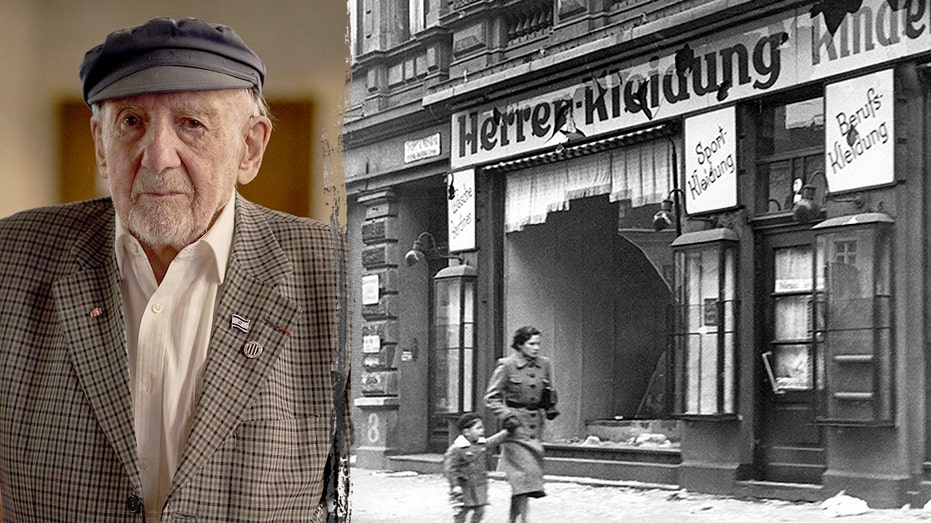
Reflections of a Holocaust Survivor: Echoes of Kristallnacht in Today’s Antisemitism
By [Author Name]
Date: [Insert Date]
Remembrance of Kristallnacht
As the world commemorates the 87th anniversary of Kristallnacht, a poignant recollection arises from Walter Bingham, a 101-year-old Holocaust survivor. In the wake of the devastating events of November 9-10, 1938, during which the Nazis unleashed a wave of violence against Jews in Germany, Bingham’s memories echo with unnerving clarity. At just 14 years old, he witnessed firsthand the destruction that unfolded as Jewish businesses, homes, and places of worship were brutally attacked by Nazis and their supporters.
Known as the “Night of Broken Glass,” Kristallnacht marked a turning point in the Nazi regime’s anti-Jewish policy. Over 1,400 synagogues were set ablaze, thousands of Jewish-owned establishments were vandalized, and countless homes were invaded. The United States Holocaust Memorial Museum reports that approximately 26,000 Jewish men were arrested and deported to concentration camps during this harrowing episode.
Disturbing Parallels to Today
Walter Bingham shared his reflections with The Associated Press, expressing alarm at the current rise of antisemitism, which he believes mirrors the dark atmosphere of Nazi Germany in 1938. “The events occurring today remind me of that time,” he stated, pointing to violent incidents targeting Jewish communities amidst the ongoing Israel-Hamas conflict. Bingham lamented, “We live in an era similar to 1938, where synagogues are burned, and people are attacked on the streets.”
The dangers are not just hypothetical. A notable incident in October of this year involved a deadly terrorist attack on a Manchester synagogue during Yom Kippur. A perpetrator drove into worshippers and assaulted individuals outside the Heaton Park Hebrew Congregation, resulting in the tragic deaths of two Jewish men. This attack resonated deeply within the Jewish community and beyond, serving as a stark reminder of the hostile climate they currently face.
Global Antisemitism on the Rise
Antisemitic violence has proliferated across the globe, with significant alarming trends documented. Just last year, a synagogue in Melbourne, Australia, was set on fire in an act labeled antisemitic by the country’s prime minister. In the United States, the Anti-Defamation League reported 9,354 antisemitic incidents in 2024 alone. This figure reflects a troubling rise of 5% from the previous year, a staggering 344% increase over the last five years, and an astonishing 893% jump over the last decade. These statistics paint a dire picture of the current state of antisemitism, weaving a narrative that echoes the warnings of history.
Lessons from History and Hope for the Future
Bingham’s poignant commentary extends beyond the haunting echoes of the past. He asserts that, unfortunately, antisemitism may never fully disappear. “Antisemitism is often seen as a solution to the world’s problems,” he cautioned. His perspective reveals a deep understanding of the cyclical nature of hatred, fueled by socio-political unrest and societal scapegoating.
However, he notes a crucial distinction between then and now. “In those days, the Jewish mentality was apologetic,” Bingham reflected. The prevailing attitude was one of submission: “Please don’t harm me, I won’t harm you.” This mindset, he suggests, has shifted significantly in contemporary times.
With the establishment of Israel, Bingham observes a new spirit of resilience among Jewish communities worldwide. “Today, we thankfully have the state of Israel, a very strong state,” he exclaimed. This change alters the landscape of Jewish identity and collective security, offering a protective barrier against the horrors of the past.
While Bingham remains vigilant about the resurgence of antisemitism, he expresses a tempered hope. “Even though antisemitism is still rising, the occurrence of a Holocaust is unlikely, as the state will prevent it.” His comments reflect a belief in the necessity of vigilance and the importance of understanding history to prevent repeating its most tragic chapters.
















